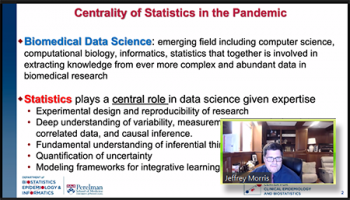

(See Event page)
“This was a wonderful and informative presentation, and a real call for our communities to get engaged in joining the discourse about the uncertainty of even the best science, and to keep open communication among the various opinion camps.”
Jim Rosenberger, (Director, NISS)
Dr. Jeffrey Morris is Professor and Director of the Division of Biostatistics at the Perelman School of Medicine at the University of Pennsylvania. His list of achievements and experience speak to a long and valued career in what he has come to label biomedical data science. Besides his more recent work in the development of quantitative methods to extract knowledge from biomedical big data he also has been involved in extensive applied work in cancer research, including constructing novel prognostic indices for hepatocytes carcinoma. In addition, during the pandemic Jeffrey has been involved in a number of COVID-19 related research projects involving serology, immunology, and modeling the pandemic. However, this talk centered around using his skills and perspectives in statistical data sciences to evaluate and synthesize accruing information in the pandemic. As part of these efforts, he authors a blog, (covid-datascience.com), in which he attempts to clearly communicate objective empirically based knowledge about the pandemic to the general public.
“To a great degree, the SARS-CoV pandemic has forced doctors and policymakers to “fly blind,” trying to deal with a virus and disease they knew virtually nothing about. As a result, sorting through the information in real time has been daunting, only exacerbated in the US by an ideologically divided society that has difficulty with mutual trust, or even agreement on common facts.”
Jeffrey Morris (University of Pennsylvania)
In this presentation Jeffrey demonstrated the central role that statistics plays in the pandemic, emphasizing that statistical thinking is crucial in order to evaluate emerging knowledge. For this reason, he urges statisticians to use this their perspective as statistical data scientists to evaluate constantly emerging COVID-19 information, filter out biases, aggregate data together, identify key insights and uncertainty, and communicate them in an accessible, balanced way.
Jeffrey walked through a number of examples where the underlying assumptions or understandings were flawed or the dissemination of information could have been improved so that policymakers or the public would have better understood what actions might have been more reasonable than those that transpired. His examples covered the gamut of issues related to the pandemic including: early denial and alarmism, how long to keep lockdowns in place, how COVID-19 spreads, the utility of masks, modeling the spread, the utility of vaccines, and variants of the disease. In all of these areas, Jeffrey maintains that input from a statistical perspective would have improved communication of the statistical underpinnings of the information being communicated. He finishes with an urging to statistical scientists to engage more with the media and public, and secure a seat at the table with societal decision makers to ensure our perspective is heard and taken into account.
Alisa Stephens-Shields (University of Pennsylvania) spent the remaining portion of this session fielding questions for Jeffrey to discuss. Some of these questions included: “I see the public treating children particularly young ones as “vectors” because they are not vaccinated. How realistic is this fear,” and related “Should the COVID vaccine be repeated each year?” Other questions included: “How might we advise students to get involved with scientific communication?”, and “What data would you have liked to have seen collected and distributed?” and “Is there any data to suggest that with schools opening full time, there will be a huge jump in transmission between young children?”
Please review the recording of this session below and access the slides that Jeffrey used during this session. If you even think that you will ever be in a position to have to speak with the media, then this is another session not to miss!
Recording of the Session
Slides Used by the Speaker
Jeffrey Morris, (University of Pennsylvania)
“A Seat at the Table: The Key Role of Biostatistics and Data Science during the Pandemic“
About this Webinar Series
The COPSS-NISS COVID-19 Data Science webinar series is co-organized by the Committee of the Presidents of Statistical Societies (COPSS) and its five charter member societies (ASA, ENAR, IMS, SSC, and WNAR), as well as NISS. This bi-weekly seminar features the latest research that is positioned on the cusp of new understanding and analysis of COVID-19 pandemic data, and promotes data-driven research and decision making to combat COVID-19. Find out more about this series and view all the previous sessions on the Webinar Series page.
